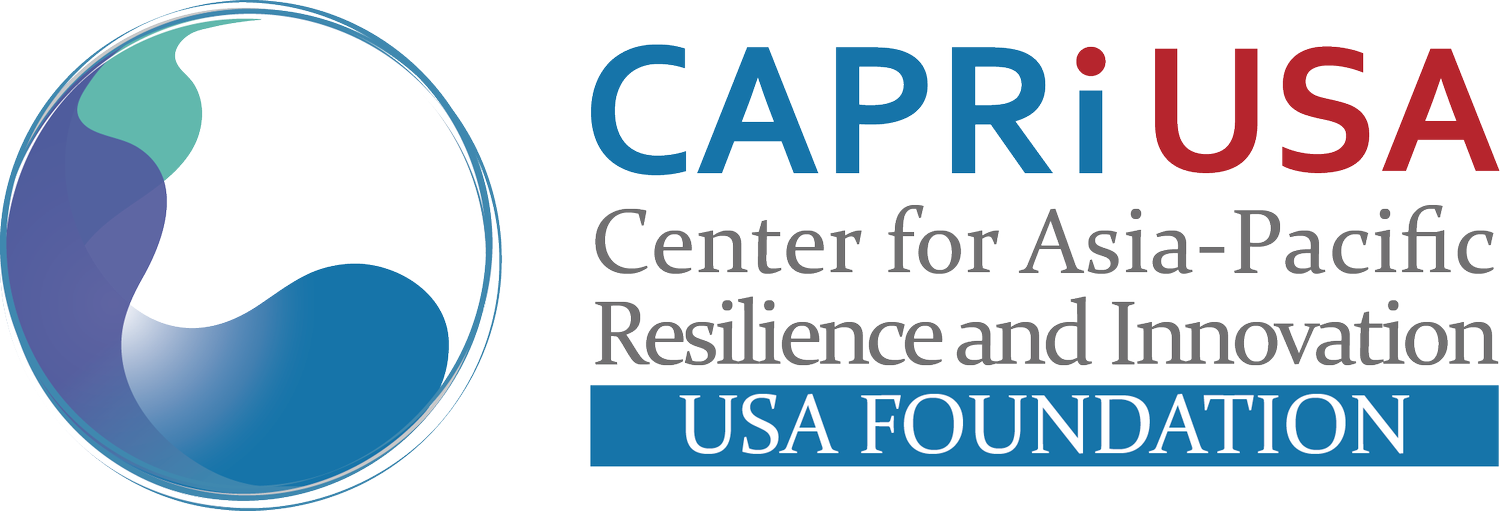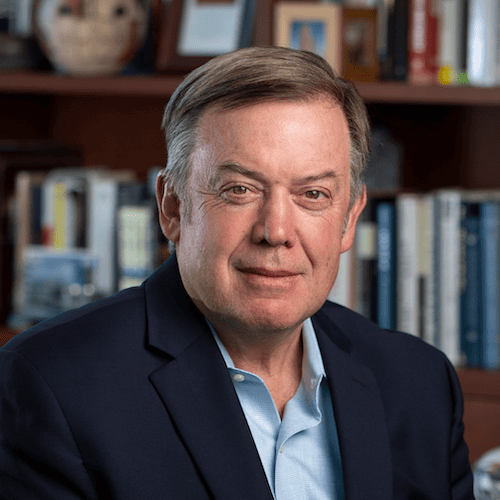The Invisible Hand Advancing Research and Innovation: How Universities and Industry Build Resilient Ecosystems
On Friday, October 3, 2025, CAPRI hosted its inaugural Leadership Forum featuring Arizona State University (ASU) President Michael Crow, Deputy Corporate Head of HR at TSMC Lynette Ng, and CAPRI Chair Syaru Shirley Lin. The forum, held at the Regent Taipei, brought together business leaders, university presidents, policymakers from Taiwan’s three major parties, and members of the diplomatic community.
Prof. Lin opened the forum by sharing how CAPRI, ASU, and TSMC share a commitment to cultivating innovative talent. CAPRI, through its research and convening, brings together academia, industry, and policymakers to jointly build a more resilient society. Prof. Lin also highlighted how CAPRI has hosted students and young graduates from countries around the world to promote a more inclusive policy space, drawing parallels to ASU’s vision of knowledge and education as a democratic and inalienable right.
Dr. Crow followed Prof. Lin’s opening remarks, underscoring the role universities play in shaping the future. University-industry partnerships enable universities to be more effective, efficient, and inclusive by preparing students for the workforce and providing tangible opportunities to work on solutions to society’s most pressing challenges. He described this as the invisible hand that brings together the brightest minds from diverse disciplines to create the most innovative technology and advanced learning.
After initial comments, Prof. Lin moderated a discussion between Dr. Crow and Ms. Ng. The conversation focused on talent circulation and incubation, including building a sustainable and diverse pipeline of engineers. Ng shared how TSMC expansion in Arizona required a fresh mindset and understanding of local contexts to attain success. Building off the success of the ASU-TSMC partnership, Ng commented that TSMC is adding oxygen to talent incubation globally– increasingly looking for new partnerships and opportunities and building pipelines to bring more women into the industry.
Towards the end of the event, the floor was opened to the audience for questions. Questions by Alexander Huang (KMT), Alex Lee (EQT), Chi-Hung Lin, (National Yang Ming Chiao Tung University), Tina Lo (O-Bank), Javier Cheng (ITRI), and Austen Wei (CAPRI) addressed the need for education reform in both the US and Taiwan, curriculum development and academic culture, and the need for value-oriented technological development and innovation. On this last point, asked by Representative Ruth Bradley-Jones of the British Office Taipei, Crow underscored that values should always drive knowledge production and that education should be interdisciplinary so that engineers view themselves as fundamental to the betterment of humankind.
Speakers
Michael Crow
President, Arizona State University
Michael M. Crow is an educator, knowledge enterprise architect, science and technology policy scholar and higher education leader. He became the sixteenth president of Arizona State University in 2002 and has led ASU’s rapid and groundbreaking transformation into one of the world’s best public metropolitan research universities. As a model “New American University,” ASU simultaneously demonstrates comprehensive excellence, inclusivity representative of the ethnic and socioeconomic spectrum of the US, and consequential societal impact.
Lauded as the “No. 1 most innovative school” in the nation by U.S. News & World Report for 10 straight years, and garnering top accolades for its global impact and student employability, ASU is a student-centric, technology-enabled public enterprise focused on global challenges that grew its research expenditures more than eight-fold since 2003 and earned AAU membership in 2023. Under Dr. Crow’s leadership, it has established more than thirty new transdisciplinary schools, including the School of Earth and Space Exploration, the School for the Future of Innovation in Society and the School of Human Evolution and Social Change, and launched pioneering multidisciplinary initiatives including the Biodesign Institute, Julie Ann Wrigley Global Futures Laboratory, the nation’s first School of Sustainability, and significant initiatives in the humanities and social sciences.
Lynette Ng
Deputy Corporate Head of HR, TSMC
Lynette Ng is a seasoned HR professional with over 30 years of expertise in diverse HR functions, including strategy, transformation, and total rewards. Lynette has been with TSMC since August 2022. She currently serves as deputy corporate head of HR, spearheading Corporate HR Transformation and Global HRBP for Global Operation and HR Transformation where she oversees global talent strategy, international HR business partnerships, global mobility, and digital transformation initiatives.
Prior to joining TSMC, Lynette held pivotal senior leadership roles in several renowned multinational corporations, including Sanofi, eBay, GlaxoSmithKline (GSK), and Volvo. During her tenure as SVP Group Head of Total Rewards at GoTo Group, she not only played a crucial role in the company’s IPO achievements but also successfully led the group’s listing on the Indonesia Stock Exchange (IDX). As the founder and CEO of Talent Code Global, Lynette has pioneered innovative HR practices to unlock organizational potential. She is celebrated for her visionary approach, utilizing data and technology to amplify organizational performance. Her exceptional contributions to human capital management have garnered numerous accolades. Lynette’s background in business and management significantly enhances her expertise in the field. She is passionate about integrating technology within HR practices and champions agile methodologies to achieve sustainable talent management outcomes.
Syaru Shirley Lin
Founder and Chair, Center for Asia-Pacific Resilience and Innovation
Syaru Shirley Lin is the founder and chair of CAPRI, a nongovernmental, nonpartisan international think tank advancing global resilience and innovative policy through comparative research in the Asia Pacific. Prof. Lin is also the president of CAPRI USA, an independent international organization and CAPRI’s US affiliate. A nonresident senior fellow at the Miller Center of Public Affairs at the University of Virginia and adjunct professor at the Chinese University of Hong Kong, she teaches in Taipei, Hong Kong, Beijing, and Virginia. She serves on the steering committee of the World Economic Forum’s Partnership for Health System Sustainability and Resilience, and she was a senior advisor to Taiwan’s Talent Circulation Alliance, an initiative promoting Taiwan as a regional and global hub for talent.
Her book, Taiwan’s China Dilemma, analyzes cross-Strait economic policy, with a focus on the semiconductor and petrochemical industries, and her commentaries appear frequently in both English and Chinese media. She sits on the boards of MediaTek, TE Connectivity, Goldman Sachs Asia Bank, Langham Hospitality Investments, and the Focused Ultrasound Foundation.
Earlier in her career, Prof. Lin was the youngest woman and one of the first Asian partners at Goldman Sachs, where she spearheaded investments in Asian technology start-ups. She led the firm’s highly successful investments in China, including the first institutional rounds in Alibaba and SMIC. She holds a PhD and master’s degree from the University of Hong Kong and a bachelor’s degree from Harvard College.
Organized by
Date: Friday, October 3, 2025
Location: Regent Taipei











